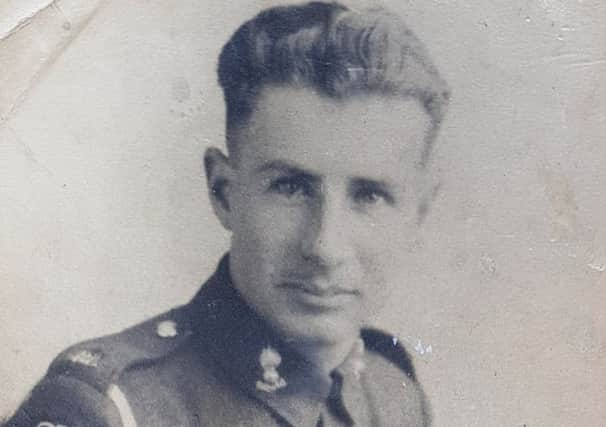Obituary: Jock Duffy, builder and marathon runner


Most people who work in a physically demanding environment don’t have much energy left over at the end of the day, but John “Jock” Duffy was not most people. While working as a builder he would often run for 15 miles to and from work, in addition to serious training over the weekend, adding up to up to 90 miles a week. That effort certainly paid off: in 1953 he won the Scottish Marathon with the fastest time ever – despite only having been competing in marathons for three years. What’s even more impressive is that he did this all without the benefit of fancy cushioned running shoes; this hardy Scot pounded the pavements in old-style plimsolls.
John Duffy was born in Broxburn in West Lothian in 1919, the middle child of 11 (five girls and six boys) to Patrick and Bridget, a loving couple who instilled in him a strong Catholic faith. While just a boy, still studying at St Nicholas, he worked part time in a rubber factory, and then, at the age of 12, he got a job in the same mine that employed his father and many other men from the town. Running the carts in the mine helped him develop the leg strength that would later give him an advantage as a runner. His grandchildren loved hearing the fascinating stories he told about life in the mine; he often said that he went in as a boy and left as a man.
Advertisement
Hide AdAdvertisement
Hide AdJohn Duffy’s world changed dramatically in 1940. Hitler’s army was advancing and there was a very real threat that Britain would be invaded. When the young man from Broxburn enlisted on 16 May, 1940, he had no idea whether he would ever come home. He served as a Sherman tank driver in the Eighth Army under Field Marshal “Monty” Montgomery, seeing action in the North African and Italian campaigns.
It was during his army service that he first started running competitively, despite initially being more interested in boxing.
He joined the army cross-country team and towards the end of his stay in Italy became Central Mediterranean Forces Cross-Country Champion. He was in Italy when the Armistice was declared, after which he was stationed in Essex, waiting to be demobbed.
A chance meeting at a Rayleigh Weir ballroom dancing event would change the course of his life. May Wheelright, who at the time was in the Women’s Royal Auxiliary, became his sweetheart and dance partner, but he could not persuade her to move to Scotland with him, so after they married in 1946 they settled in Hadleigh in Essex. They went on to have three daughters: Maria, Frances and Patricia, and continued to indulge their love of ballroom dancing. In fact, Jock danced right up until the age of 92, taking part in as many dance evenings as he possibly could.
As there were no mines in Essex to employ Duffy, he trained to become a bricklayer, and started building up his business as a builder. Due to the amount of post-bombing reconstruction that was required in and around London, there was no shortage of work, and he expanded his business, taking on other employees.
As well as doing all this hard graft during the daytime, Duffy was travelling the country to take part in marathons. Although he had started out as a cross-country runner, he switched to marathons in 1950, even though he didn’t particularly enjoy them at first. His local athletics club, Hadleigh Olympiads, didn’t have track facilities, so he did all his training on the roads, his partners often including Ken and Laurie Cook, the well-known running brothers. He also became friends with Jim Peters, the world-famous marathon man.
Duffy’s long-distance running debut was in 1951, when he finished fifth behind winner Jim Peters in the Essex 20 with a time of 2:00:20. The following year he came second to Peters, recording a time of 2:01:15.
He made his marathon debut in the 1952 Polytechnic Marathon, which ended with a nail-biting contest between Peters and Stan Cox, the former winning by a minute, setting a new world record of 2:20:42.2. While all eyes were on these two and their dramatic rivalry, Duffy whizzed through to the final line, coming eighth with an impressive time of 2:36:35. That year he won the Lalande Trophy, awarded every year to the first newcomer to finish.
Advertisement
Hide AdAdvertisement
Hide AdRunning was very much a labour of love for him, as there was no sponsorship in those days, and he had to cover transport and entry costs himself. His commitment never wavered, though, and he certainly never let day-to-day challenges diminish his energy. The night before he won the 1953 Scottish Marathon, for example, wasn’t spent carb-loading in a nice, peaceful bed: he was travelling overnight with his family from England and didn’t get any sleep.
As he got older he stopped running competitively, but remained heavily involved with the club at Hadleigh. He was believed to have been the oldest surviving Scottish marathon runner.
It wasn’t until after he retired that Duffy fulfilled his desire to return to his beloved Scotland, settling back in Broxburn in his sixties. Not a man to put his feet up, he continued to work, building extensions for friends and family.
He was a very popular and witty man who was adored by his family, and was as modest about his achievements as he was quietly proud and dignified. Even when he was staying in for the day he always wore a shirt and tie. In his later years, when he could no longer dance or run, he loved to watch ballroom dancing, and was known to many as a master of crosswords.
Jock Duffy is survived by his three daughters, eight grandchildren and six great-grandchildren.
His wife, May, from whom he was latterly separated, died in 2012.
ASHLEY DAVIES